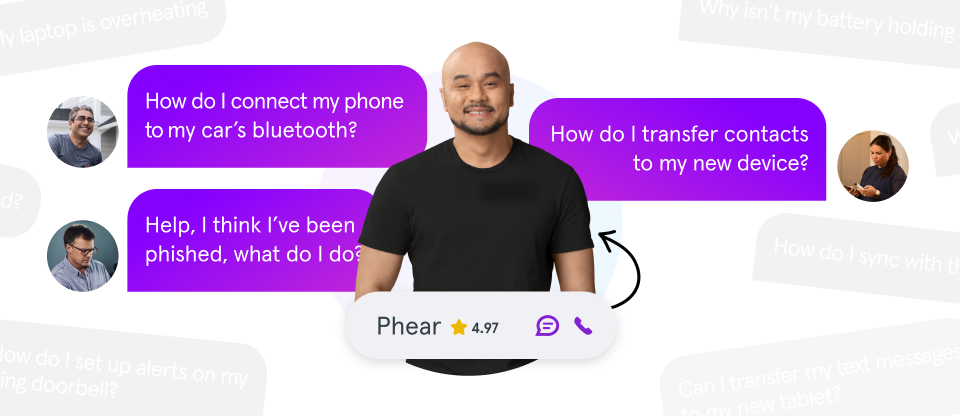For most of us, the internet is where we go to read the news, scroll through social media, and research everything from preschools to our next vacation. But there's another layer of the internet that's hidden—and where your identity is concealed. It's called the dark web, and if you've ever wondered what it is or how it works, you're in the right place.
Here at Asurion, we help you protect your tech, whether you want to secure your phone from hackers or learn what to do if you spill water on your laptop. Here's our guide to what the dark web is and what you need to know about it.
Who created the dark web?
In the mid-1990s, computer scientists at the U.S. Naval Research Laboratory built a platform that allowed intelligence officers to share files anonymously. This mysterious communications channel was opened up to the public on purpose; by flooding it with information, there would be more cover for official documents and information. That platform is what we now know as the dark web.
What's the difference between the dark web, the deep web, and the surface web?
People often assume that the dark web and deep web are the same thing, but they aren't. Let's look at all three definitions.
- The surface (or open) web: This is what you know as the World Wide Web. It's the version of the internet that you access via Google, Bing®, or any other search engine, where information is cataloged and searchable, including your location.
- The deep web: This is the unindexed part of the internet, and it includes anything that can't be accessed and cataloged by search engines. Deep web content is either behind a paywall or requires login credentials, and it accounts for more than 95% of all websites. Here are some examples:
- Email accounts
- A company intranet
- Medical records
- Credit card accounts
- Membership websites
- A university's online library index
- The dark web: A small part within the deep web, the dark web can't be indexed by search engines. It's only accessible to users who have a specialized browser.

Don’t waste time scrolling
Life is short. Ask our experts and get answers now.
What is on the Dark Web?
Illegal content
The Dark Web is notorious for hosting a wide range of nefarious activities. It is a hotbed for criminal activity, including the sale of drugs, firearms, counterfeit money, and stolen subscription credentials. Users can also purchase hacking services, usernames, and passwords, enabling them to breach other people's computers and networks. But the dark web isn't all bad. Human-rights groups, medical researchers, and victims of abuse have used the dark web for privacy, especially in countries that are hostile to the open internet and free speech.
Criminal activity
Studies have shown that a significant portion of Dark Web listings host illicit material. Criminal groups operate on the Dark Web, distributing sophisticated malware known as ransomware, targeting individuals and organizations. They encrypt victims' data and demand payment in cryptocurrencies to unlock it. Failure to comply may result in the release of sensitive information on the Dark Web.
Hidden services and private networks
One of the distinguishing features of the Dark Web is its hidden services. Websites on the Dark Web use a scrambled naming structure and end with the domain suffix ".onion". These websites are often impossible to remember and can change addresses frequently to avoid detection. Additionally, private networks within the Dark Web create encrypted connections, making it difficult to trace user identities and activities.
Online content
While the Dark Web is predominantly associated with illegal activities, it also hosts legitimate content. Users can find forums, blogs, and websites discussing various subjects, often with greater anonymity than on the surface web. The Dark Web is also home to whistleblowing platforms and alternative news sources that prioritize privacy and security.
How to access the Dark Web?
Accessing the Dark Web requires the use of the Tor browser. Tor routes web page requests through a network of volunteer-operated servers, making it difficult to trace the user's IP address. However, accessing the Dark Web is not as simple as using a regular browser. Tor provides layers of encryption, ensuring a secure connection. It's important to note that accessing the Dark Web can be unreliable and slow due to the nature of the network.
Dark Web search engines exist, although they struggle to keep up with the ever-changing landscape. These search engines may return repetitive and irrelevant results. Additionally, directories like The Hidden Wiki can provide links to Dark Web websites, but they may also lead to dead ends due to constant movement and shutdowns of these sites.
Government agencies and the Dark Web
Law enforcement agencies around the world actively monitor and target criminal activities on the Dark Web. In recent years, there have been successful operations to shut down illegal marketplaces and apprehend individuals involved in cybercrime. However, due to the anonymous nature of the Dark Web and constant address changes, it remains a challenging environment for law enforcement.
It is crucial for internet users to exercise caution when accessing the Dark Web. Engaging in illegal activities or visiting suspicious websites can have severe legal consequences. Always prioritize your online security and privacy, even when exploring the depths of the internet.
By understanding the nature of the Dark Web and its potential risks, users can make informed decisions about accessing and navigating this hidden part of the internet.
How to stay safe on the dark web
If you do decide to explore the dark web, you'll face many of the same risks found on the surface web. So don't use your real name, and create credentials that are totally separate from those you use every day—including usernames, emails, and passwords. If you're going to buy something, use a prepaid card without your name on it, not your credit or debit card. Here are some more tips:
- Use a strong VPN.
- Don't download files from the dark web, but if you must, use an antivirus program.
- Use a secondary user account on your computer, not your main admin account that holds all your information.
Tried these steps and still need help? We got you. Get your tech problem solved when you call or chat with an expert now.





